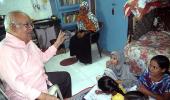A few days later, we load up our stuff in the car and leave, as dada-ji stands at the gate.
His face is tentative, and he definitely looks sad at the prospect of being alone for the first time in what must feel like a century.

It's been a hot minute since I visited this space. Which is truly odd, because things have transpired, as they always do; a side effect of being alive even when you're not putting your back into it.
My dadi (paternal grandmother), who was probably in her mid-80s -- back then apparently, people rarely kept track of their ages or the number of children they've birthed -- passed away recently.
Towards the end, she was fair-skinned and frail like she'd always been, but her voice boomed like I'd never heard in my life before.
I, along with my siblings, was summoned to our hometown, where we were to attend the last rites, meet relatives we hadn't seen in centuries and find corners in the house where we could hug our knees and cry softly in isolation.
My dadi and I had been close when I was little. But as I grew up and moved cities, my visits to her became infrequent and in hindsight, somewhat perfunctory.
I'll save you some snap judgement on the deadbeat-granddaughter-helpless-and-aging-grandmother trope.
Even at her most physically vulnerable, my dadi was feisty, telling her husband to shut up when he started to get on her nerves and shooting zingers at her kids every time they cracked a joke at her expense.
A few years ago, during one of my trips to the hometown on account of a wedding in the family, she inquired about my salary. I wasn't making much at the time, but I figured it'd still be a lot for someone like her, who had lived in our ancestral village for a better part of her life.
I said proudly, "I get Rs 25,000 per month." She patted me on the back and said, "It's okay, you'll make more in the future."
Another time, she watched quietly as my younger sister and I argued about something.
When my sister left the room after delivering a particularly singeing retort, dadi said to me, "Apni izzat apne haath mein hoti hai (Your honour is in your own hands)."
Dadi may have cast me aside in the later years of her life, but her marriage was rock solid till the very end.
The constant refrain at the funeral and following rituals was that my dadi was extremely lucky to have left before her husband. To die a suhagan (married woman) is the ultimate blessing it seems.
Extremely patriarchal reasoning aside, I completely agree with this. I wouldn't want to be companion-less in debilitating old age. Unless said companion has been an a******e.
Then, by all means, take him, god. Let me know if I can do anything to help, even.
My dadi had been a devoted wife. Every night, she would wobble to bed, dead-tired from all the cooking and cleaning and tending of the house, to give a head massage to my grandfather.
This ritual was never interrupted, save for a couple of days when she had pulled a muscle around her waist.
One day, my mother woke up from her afternoon nap and sensed some movement in my grandparents' room. Alarmed, she peered through the door that was left ajar.
She saw dadi's tiny body rocking back and forth, her sari pallu swaying on her head, as she pressed her husband's feet.
This seemed a stark contrast to an earlier story I'd heard about her.
A few years into their marriage, my dada-ji, then a hot-headed youngster (which Indian man isn't *groan*), had hit her. She raised hell and terrorised him so much, he fell to her feet and never so much as raised his voice at her. He did repay her for her lifelong service, though.
Towards the end, he was instructed to never leave her sight, and he happily obliged. He would take great care of her diet and sleeping pattern, and kept her engaged in conversation to pass the time.
My dada-dadi weren't prone to sentimentalities. When I see him this time, wife-less and stoically trying to make sense of it all, I feel the urge to hug him, to ask if he'd like to come and stay with me for a while. But I hesitate.
Things like these rarely swing in my favour.
The day all the rituals are done and dusted, the hundreds of people who came over to pay their last respects have retreated, my parents, siblings and I are getting ready to go to my aunt's house to hang out with the cousins.
As I turn to lock the main gate of the house, I am wracked with guilt, for this feels like abandoning dada-ji, even if only for a few hours.
"I can't imagine what is going on in his head right now. Should we even be leaving him alone?" I ask dad.
"Don't worry," he says. "You think too much. These people are not so sensitive."
A few days later, we load up our stuff in the car and leave, as dada-ji stands at the gate. His face is tentative, and he definitely looks sad at the prospect of being alone for the first time in what must feel like a century.
I look back at him as the car pulls away. This is without a doubt, the saddest thing I've ever seen. I can feel my heart drop to my stomach.
Should I have hugged him?
Was he expecting it?
Did he even know that a hug would've helped a bit?
Is my father right and I am just projecting?
I don't want to know. If I have my way, I will make sure to be the first one to go. Unless my companion at the time is an a*****e.
Feature Presentation: Ashish Narsale/Rediff.com







